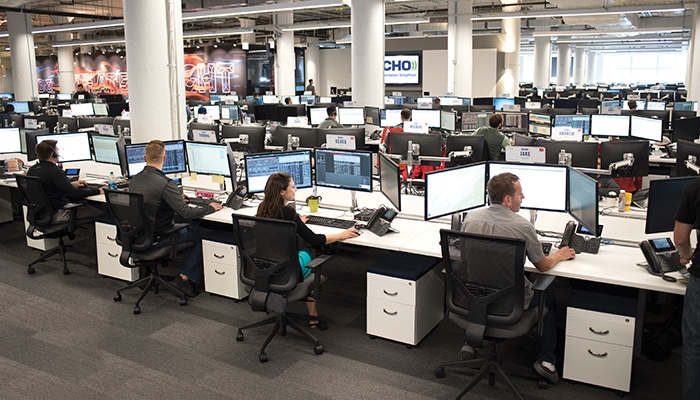3PLs Keep IT Together

Serving as the glue that holds everything together in the supply chain, third-party logistics providers inject technology tools, advanced capabilities, and exacting attention to detail into the services they provide shippers. Here’s how they seal the deal.
Third-party logistics (3PL) providers assume a role of outsized importance in today’s supply chain environment. They are “the connectors, touching nearly everything that is moving in the supply chain,” says Kingshuk Sinha, professor and chair of the Supply Chain and Operations Department at the University of Minnesota.
The heightened uncertainty and unpredictability that has characterized the supply chain in recent years only increases 3PLs’ importance.
Shipping is “undoubtedly under stress,” says Douglas Kent, executive vice president of corporate and strategic alliances for the Association for Supply Chain Management (ASCM). The capabilities 3PLs offer, particularly through increasingly sophisticated technology solutions, are central to shippers’ efforts to combat that stress.
“With the combination of some of the macroeconomic factors and workforce shortages, and the dynamic nature of supply and demand over the course of the disruptive events we’ve seen over the past few years, shippers have to rely on some advanced technology to make their services effective and efficient,” Kent says.
The onset of just-in-time shipping and the complexities of global commerce have increased technology’s importance, says Zach Jecklin, chief information officer for Echo Global Logistics.
“Because transportation remains fragmented, technology is key to sourcing and tracking the best options to fit a shipper’s needs and ensure the right product gets to the right place at the right time,” Jecklin says. “Technology has brought efficiencies and support at a level not previously seen.”
Providing Advanced Solutions
The two largest categories of technology that shippers are embracing today are data and analytics, and track and trace.
Data and analytics focus on gaining insight into creating a more efficient supply chain, such as through optimized routes, predictive fleet maintenance, and inventory management controls, among other efforts. Track and trace means a detailed view of where goods are in the supply chain.
Transportation management systems—software systems that help manage the logistics of distributing goods—are a core IT solution that 3PLs often bring to shippers to encompass a range of these purposes, from planning to executing and optimizing.
Big data and analytics has been at the top of ASCM’s annual top 10 trends list in recent years, and that emphasis is not likely to lessen anytime soon, particularly as artificial intelligence (AI) becomes more widely used, notes Kent.
For third-party logistics providers and shippers to move products quickly, particularly in light of the growth of ecommerce, inventory positions across their networks must be expertly managed to maximize efficiency.
“Our expectation as consumers is that when we order things we’ll get them in 48 hours or less—that’s the Amazon Prime effect,” Kent says. “The accuracy of those deliveries are important, and so is being able to optimize cost-efficiency. The balance between reducing the time and increasing the accuracy of delivery, managed alongside the cost of those transportation activities, is key.”
Tracking and tracing allows 3PLs to monitor time, temperature, and integrity in the distribution of goods and to share that invaluable information with shippers.
“Shippers want to know if the power in a refrigerated truck gets shut off somewhere in the middle of a highway,” Sinha says. “That is the kind of transparency we are seeking and that the technologies are providing now.
“The data does not just tell you what happened, but also where it happened, when it happened, and why it happened,” he says.
Disruption-Proof Supply Chains
The ability of 3PLs to process and learn from data is the key to help their shipping clients thrive in an era “when supply chain disruptions are more of a norm than an exception,” Sinha notes.
“The better you understand the risks and come up with contingency plans that allow you to deliver on the promise you made through a contract, the better off you are,” Sinha says. “The technology becomes consequential when you factor in macro issues that are well outside the control of any company or country.”
Some of the largest technology-driven shipping organizations are employing artificial intelligence and machine learning to develop models to predict supply and demand. This not only helps with pricing but also with getting “the right equipment to the right place where the freight is located,” notes Jecklin.
“Many trucks roll across the country with little or no freight on their backhaul, so whatever efficiencies can be developed not only save time and money, but also cause less wear-and-tear on equipment and roads, as well as reduce the impact on the environment,” Jecklin says.
The example of Echo Global Logistics helps demonstrate how a service provider can serve shippers no matter where they are on their “technology journey.”

Rather than take a “one-size-fits-all” approach, Echo Global Logistics provides a variety of technology solutions to tackle any shipper or carrier challenge. For example, the 3PL offers EchoShip, a self-service shipping platform for less-than-truckload (LTL) and truckload shippers.
Echo Global Logistics: Blending Tailored Tech Solutions with Expert Support
“Technology at your fingertips, and experts by your side.” That tagline has endured for more than a decade at Echo Global Logistics, a leading provider of technology-enabled transportation and supply chain management services. It is at the core of the company’s approach to empowering shippers and carriers and providing sophisticated tech solutions and expert, high-touch support in synchronized step together.
“We recognize that technology, while powerful, is not 100% of the equation for being a great brokerage and managed transportation solution for a shipper or carrier,” Jecklin says. “It’s our people’s expertise and the relationships that they have that add that extra variable to drive our service and competitive advantage in the marketplace.”
Tackling All Challenges
In addition, Echo, which is based in Chicago, doesn’t take a “one size fits all” approach to offering technology solutions. Instead, the company is built around a variety of solutions to tackle any shipper or carrier’s challenges.
Those solutions for shippers include instant quoting on Echo.com, as well as EchoConnect, a suite of tech offerings that include EchoTMS; EchoShip®, a self-service web portal for LTL and TL shippers; and EchoSync, the company’s EDI and API integration program.
“When it comes to technology, we understand the industry is incredibly large, and technology adoption across the different players is vast and differentiated,” Jecklin says. “So we don’t have one offering that we try to go to every player in that space with. We have many offerings to suit the needs of different shippers and carriers, depending on where they are in their technology journey.”
Jecklin says Echo emphasizes solutions and services tailored to the individual client rather than trying to treat everyone’s circumstances, goals, and preferences the same.
“The way a very large shipper wants to integrate to create efficiencies with technology is very different from the way a small business shipper would look to do that for their two or three LTL loads a month,” Jecklin says. “Both of those customers are very important to us, so we want to go to market with a solution for both shipper profiles.
“While the technology we use to do that looks different for each, both types of shippers can experience the same great levels of service and competitive pricing that comes with the Echo brand.”
Jecklin notes that Echo has been multimodal from day one, adding crucial value to its customers.
“Since our founding in 2005, Echo has focused on providing value to shippers through optimizing their transportation spend,” Jecklin says.“Having industry-leading capabilities across all modes gives us a leg up in executing this vision.
“Echo is focused on automating many tasks within the lifecycle of a shipment. But ultimately, when an issue arises, we want to make sure that our experienced employees are enabled by the tech to make sure the problem is solved for the shipper,” he adds.
“We understand the serious implications that can arise for a shipper when something goes wrong,” Jecklin says. “This is where the combination of people and technology becomes so powerful. Echo’s employees treat those issues with the same sense of urgency that our customers do, and we utilize our technology to drive both efficiency and transparency of the solution.”

Echo Global Logistics emphasizes the importance of providing rapid, expert personal support for clients. Since its founding in 2005, the 3PL has focused on providing value to shippers by optimizing their transportation spend with industry-leading capabilities across all modes.
Building on Expertise and Cementing Trust
Echo’s emphasis on offering services that fit the needs of a range of shippers helps serve a supply chain that comprises a range of players. “Everybody recognizes that technology is a tide that will lift all boats, whether you’re a small, medium, or large institution,” Sinha says.
“A 3PL’s ability to be an egalitarian to ensure that it has not only advanced technologies, but also the technologies that can integrate a large network of service providers with varying degrees of technological capabilities is very important,” Sinha says. “They have to be able to connect with all of them.”
Sinha says 3PLs today understand that they need to invest not only in technology but also in technological expertise, prioritizing hiring the types of experts that Silicon Valley covets.
“They make sure that the people they recruit are not just hotshot computer scientists, but that they also have the ability to talk to both senior management and the people on the front line,” Sinha says.
As tech solutions assume a central role in the way 3PLs serve shippers, Sinha says it will be critical that the human element of those relationships does not fade into the background. In fact, he says, the quality of those relationships will be more important than ever, and the 3PLs who emphasize them will stand out.
“Technology is not meant to replace trust,” Sinha says. “Technology is there to strengthen trust.”
